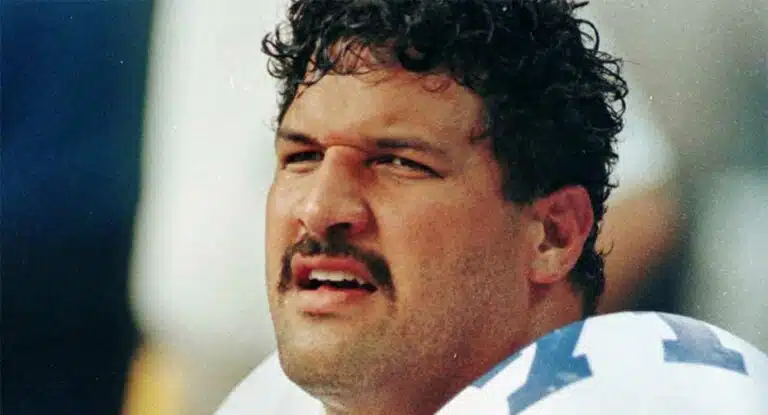Mark Tuinei | MDMA & Heroin Overdose Death
- About Mark Tuinei
- How Mark Tuinei Died
- Mark Tuinei’s History Of Substance Abuse
- Recovery Is Possible

On May 6, 1999, former NFL offensive lineman Mark Tuinei was found dead in Plano, Texas. Medical examiners identified his cause of death as an unintentional drug overdose caused by ecstasy and heroin use. He was 39 years old.
Before his death, Tuinei was a successful NFL offensive tackle for the Dallas Cowboys.
As the Cowboys’ left tackle, he and the remainder of Dallas’ stalwart offensive line played an instrumental part in the Cowboys’ four Super Bowl victories in the early 1990s.
Outside of football, Tuinei did not likely have a history of chronic substance abuse. People close to Tuinei expressed shock and disbelief at the circumstances of his death.
About Mark Tuinei
Tuinei was born on March 31, 1960 in Oceanside, California. He grew up in Nanakuli, Hawaii, where he attended Punahou School.
Throughout his playing days in high school, UCLA, and the University of Hawaii in Honolulu, he was a defensive lineman tasked with getting to the opposing quarterback, rather than protecting his own.
NFL
Tuinei had an unconventional path to the NFL, signing with the Dallas Cowboys as an undrafted free agent in 1983. After changing his position to offensive left tackle, Tuinei blossomed into a reliable, effective football player for the Dallas Cowboys over the next half-decade.
Over 14 years with the Cowboys, Tuinei won three Super Bowl championships protecting quarterback Troy Aikman, paving the way for running back Emmitt Smith, and allowing star wide receiver Michael Irvin to get open.
Tuinei made 2 appearances in the Pro Bowl for his efforts.
Retirement
Tuinei retired from the NFL in 1997, after which he returned home to Hawaii with his wife, Pono.
His former teammates recognized Tuinei’s accomplishments after his retirement, with fullback Daryl Johnston calling Tuinei a big brother figure, while Emmitt Smith credited Tuinei for his success during his Hall of Fame induction speech.
How Mark Tuinei Died
According to reports, Tuinei spent the day of May 5, 1999, with former Cowboys reserve fullback Nicky Sualua. Sualua and Tuinei purchased ecstasy and heroin, the latter of which they consumed at a North Dallas apartment.
Sualua saw Tuinei collapse later that night, administered CPR, and drove him to Tuinei’s home in his Ford truck. Both men allegedly fell asleep in the car. When Sualua woke up, he reported Tuinei was not breathing and had no pulse.
Tuinei was pronounced dead that morning at the age of 39. The official cause of death was an accidental drug overdose due to heroin and MDMA.
Mark Tuinei’s History Of Substance Abuse & Rehab
On Tuinei’s death, Plano Police Chief Bruce Glasscock said Tuinei had likely never taken heroin before. He believed the combination of heroin and the MDMA Tuinei had taken earlier that day caused Tuinei, a “healthy, 39-year-old male,” to stop breathing.
Accounts from those close to Tuinei, including former Cowboys head coach Barry Switzer, and Tuinei’s wife Pono, suggest Tuinei did not have a history of substance abuse.
Tuinei’s ostensibly clean history may be in contrast to his Cowboys teammates, who were involved in numerous drug abuse scandals during his playing career.
An NFL video short titled “A Football Life” suggested Tuinei struggled with his mental health, but failed to seek help or open up about his private struggles.
Recovery Is Possible
Mark Tuinei’s story is a cautionary tale, showing that even a single dose of illegal drugs can be fatal. If you’re worried about drug use in a loved one and are looking for help, please contact us today for information on our treatment programs.
Written by Ark Behavioral Health Editorial Team
©2024 Ark National Holdings, LLC. | All Rights Reserved.
This page does not provide medical advice.

Questions About Treatment?
Ark Behavioral Health offers 100% confidential substance abuse assessment and treatment placement tailored to your individual needs. Achieve long-term recovery.
100% confidential. We respect your privacy.
Prefer Texting?
Our friendly support team is here to chat 24/7. Opt out any time.







 Learn More
Learn More








